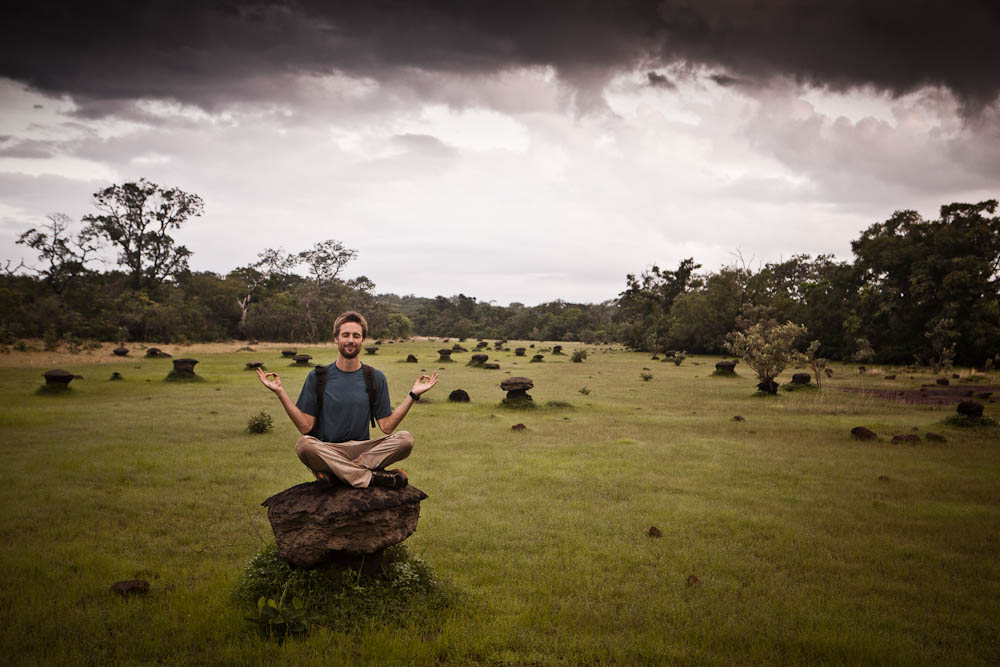2019 Middle School Galapagos Islands Conservation Expedition

| Travel Dates: | March 17, 2019 - March 23, 2019 |
| Group Organizer(s): |
|
| WTT Contact: |
|
Galapagos Conservation Expedition
Dense Amazonian rainforest, snow-capped Andean peaks, volcanic islands and raging rivers. Ecuador is a place of terrifically varied wonders, but for many the most magical are the Galapagos Islands.
From Quito, you’ll fly to the islands and begin to explore this remarkable archipelago full of different landscapes and wildlife including sea turtles, marine iguanas, blue footed boobies, giant tortoises, albatrosses, frigate birds and more. Participants will have the opportunity to practice Spanish, learn from local conservation organizations, snorkel with abundant marine life, and hike active volcanoes, all the while learning about what makes these islands so special.
Conservation Expeditions
Conservation Expeditions bring travelers to the heart of the modern-day conservation movement. Whether building nurseries for sea turtle hatchlings in Costa Rica, monitoring the health of coral reefs off the coast of Belize or helping school children in Thailand to understand the importance of wild elephants to their ecosystem, these adventures make the wonders of our world, and our responsibility to protect them, abundantly apparent.
Program Highlights
Check out some of the featured experiences of your program!

Volunteer with local scientists to assist in critical conservation efforts

Hike an active volcano

Enjoy full-day snorkeling expeditions
The Itinerary
We do everything possible to abide by itineraries as originally planned, but decades of experience teachers that we must flexible in our planning. Changes to a trip’s schedule are uncommon, but Walking Tree reserves the right to make adjustments to programming in the best interest of the group.
| Date | Location | Activity | Accommodations |
|---|---|---|---|
| March 17 | Florida - Quito, Ecuador | Travel from Florida to Quito, Ecuador. Upon arrival, we will head to our hotel in Quito this evening and have a brief orientation meeting before our morning departure to the islands. | Hosteria Airport Garden |
| March 18 | Quito - Galapagos (Santa Cruz Island) | Today we fly 600 miles over the Pacific Ocean to reach the Galapagos Islands. After landing in Baltra, we will take a ferry across the Itabaca Channel and experience a variety of ecosystems as we drive to the highlands of Santar Cruz Island where giant tortoises roam in the mist. In the afternoon, we will go sea kayaking in nearby grottoes in search of sea lions, blue footed boobies, marine iguanas, and more! At night, we'll retreat to our tents and fall asleep under the stars. | Cerro Mesa Camp |
| March 19 | Santa Cruz | Today, we drive down to Puerto Ayora and visit to the famous Darwin Research Station. Upon arrival, we'll dive into our volunteer work with local authorities. We'll receive an expert lecture, then get into the field to lend a hand on a research project or conservation effort. Projects can range from tracking wild giant tortoises, to biodiversity surveys, to working on a restorative ecology project for endemic plant species. More details on your project will be laid out in the weeks prior to your departure. | Hotel Palmeras |
| March 20 | Santa Cruz - Isabela Island | We'll take a "speedboat" over to Isabela Island. Today is our most challenging adventure yet. We'll hike up to the rim of Sierra Negra, the second largest caldera in the world and an active volcano. We'll see firsthand the geological processes that shaped these islands, and spot wildlife on the way. We'll retreat to a locally-run camp in the highlands where we'll meet a man who raises and cares for giant tortoises. | Campo Duro |
| March 21 | Isabela | After an early breakfast we go on a 45 minute boat ride to a world famous site where we will snorkel through lava tunnels and amongst a stunning array of marine life. Our local guide will explain the significance of the Galapagos as an oasis for marine species, and we'll see the evidence firsthand. It's not uncommon to see blue-footed boobies, green sea turtles, and sharks as we glide over beds of anemones and corals. | La Gran Tortuga Hotel |
| March 22 | Isabela - Santa Cruz - Quito | Today we'll make our return from the islands to Quito. Upon arrival in the capital, we will have dinner in the historic center and celebrate our great adventure. | Hosteria Airport Garden |
| March 23 | Quito - Flordida | Today we will wake early and begin our return to Tampa Bay. | Your own bed! |
Accommodations
In order to provide a safe and memorable experience, we follow strict guidelines when choosing group accommodations. Walking Tree partners with hotels and guest houses which are centrally located, locally operated, clean and safe. We inspect each partner hotel to ensure they meet these standards.

Hosteria Airport Garden
Hosteria Airport Garden is 3-star hotel located a short drive from the international airport in Quito. Accommodations are clean, comfortable and modern, and there’s a pool!

Hotel Palm Garden Galapagos
The Hotel Palm Garden Galapagos offers clean, comfortable and spacious rooms for guests. Each room can house 2-3 students per room. Some of the amenities include a pool on site, free Wi-Fi, air conditioning, hot water and group sitting areas around the property. Students will be grouped in their rooms according to gender and availability.

Campo Duro
Campo Duro is a camping area near the Sierra Negra Volcano. This camp site offers a unique take on adventure and accommodations. Tents and bathrooms are separated by gender. Campo Duro practices ecological tourism with solar panels to heat their water.

La Gran Tortuga Hotel
La Gran Tortuga Hotel is located on Isabella Island and is a small, locally run hotel on the island. This three star hotel prides itself on operating in an eco-friendly manner and hosts conservationists who travel from around the world to visit the island. Students will be roomed based on their genders and separated from adults. Wifi is available and breakfast will be provided in the hotel.

Reserva Cerro Mesa Galapagos
Located on Santa Cruz Island, Reserva Cerro Mesa provides students a unique chance to camp on the edge of a now extinct volcanic crater. Students will sleep in tents with sleeping bags and pads which are grouped together. Adults and students will be “tented” separately. Bathrooms and electricity are available within walking distance of the campsite.
Safety and Support

EASY FUNDRAISING & PAYMENT

24/7 GLOBAL EMERGENCY LINE

HIGHLY VETTED PARTNERS

EXPERT LEADERSHIP

PRIVATE GROUP GUARANTEE

COMPREHENSIVE CURRICULUM SUPPORT

DEDICATION TO CULTURAL ENGAGEMENT

ALL-INCLUSIVE PRICING
This was our daughter’s 2nd trip with Walking Tree. In 2016, she took her school’s first trip with Walking Tree to Ecuador, and absolutely loved it. Once again, the Walking Tree representative was excellent. My daughter said Ben really made the trip, and worked hard to keep the group happy. Other positives: communication before the trip, website outline, daily blogs and trip photos. Very professional organization. We feel very secure sending our student out into the world with Walking Tree.
Andrea
Parent of Olivia, traveler on California Cultural Journey
Your Adventure Includes
Program Tuition Excludes: Travel insurance, baggage fees, passport/visa fees, laundry, souvenirs, and activities not listed on the itinerary.
Need to Raise Money? We Have You Covered.
Walking Tree Travel is proud to team up with Equal Exchange, a worker-owned cooperative that distributes organic coffee, tea, sugar, bananas, avocados, cocoa, chocolate bars, and more. There is no limit to the amount you can earn, so the sooner you can start, the better!
Learn more here.


Resource Center
Why should high school students travel abroad? What happens if a participant gets sick? How quickly do we need to enroll? We’re sure you have plenty of questions and we’ve got you covered! Visit our Resource Center to discover the answers to your most pressing questions and contact us anytime with additional questions.














